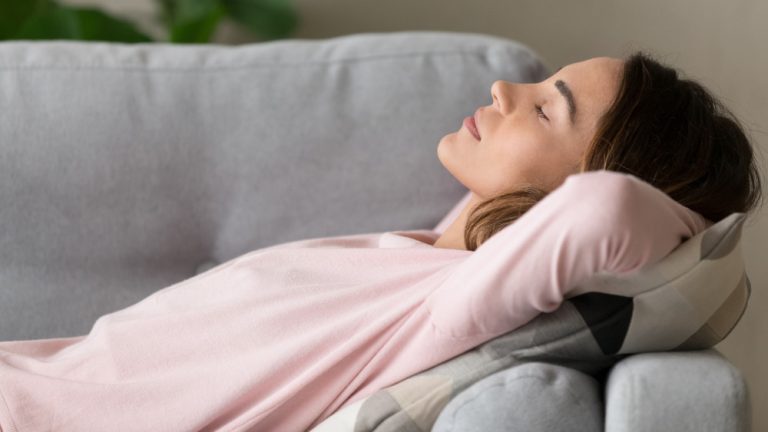There’s nothing quite like sleeping an extra hour under the covers on a lazy Sunday morning. But if you find yourself regularly cutting your sleep short the rest of the week, even that extra 60 minutes can’t save you from the damage you’re causing to your body. The National Sleep Foundation recommends that adults aim for between seven to nine hours of sleep nightly.
Despite this recommendation, we’re a sleep deprived nation. The American Sleep Apnea Association warned that 70 percent of adults don’t get the required amount of sleep they need at least one night a month, and 11 percent of us admit we don’t get the recommended hours of sleep nightly. And that’s bad news on a number of levels. Our skin and hair, our hearts and brains, and really, every cell in our bodies require proper sleep and rest in order to function at its peak. When we cut back on sleep, the whole body suffers. How can you know if your’e affected? If any of the following symptoms happen to you, you’re probably not sleeping enough.
If you feel moody all the time, you may be sleep deprived

If you find yourself snapping at your kids or coworkers, you should know that rapid changes in mood could be the result of sleep deprivation. Psychologist Amie M. Gordon wrote in Psychology Today that when people miss out on sleep, they can feel increasingly more “irritable, angry and hostile.” Lack of sleep can also leave you feeling more emotional overall. “People who suffer from sleep loss are especially likely to react negatively when something doesn’t go well for them,” the expert continued.
A study from Tel Aviv University published in The Journal of Neuroscience supports this idea. Researchers found that individuals who are sleep deprived can lose the ability to differentiate between what is important and what isn’t, making even small things seem incredibly significant and greatly increasing your risk of unexpectedly flying off the handle. The change in mood can occur after missing just a single night of proper sleep, they found.
The change in a sleepy person’s behavior appears to stem in part from the amygdala, a section of the brain that controls emotions. When short on sleep, it becomes increasingly sensitive, reacting more strongly to different emotional situations.
The overwhelming urge to procrastinate could be the result of too little sleep
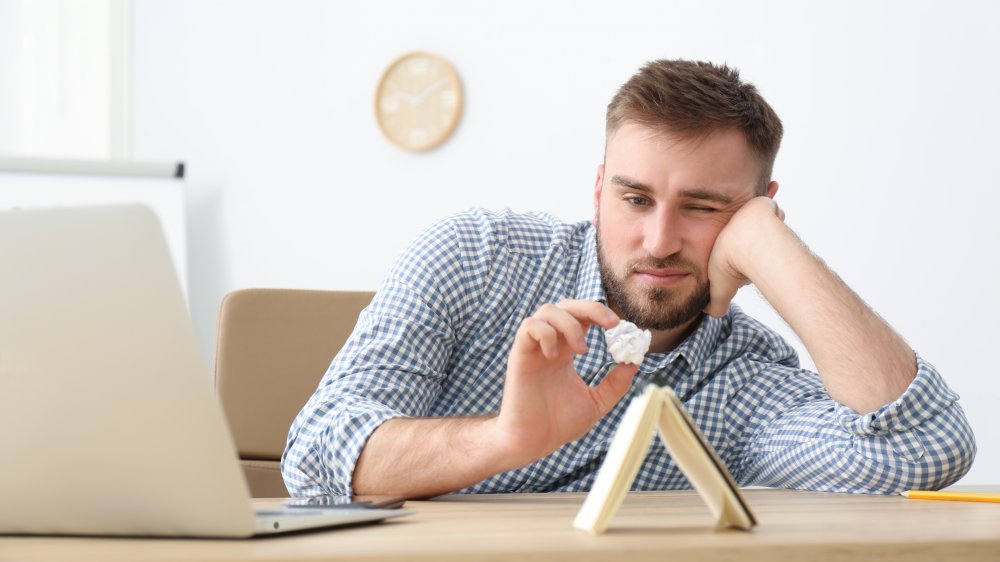
We’ve all stayed up too late trying to get some extra work done or set the alarm super early to log some extra hours working at the start of the day. While those strategies may help in the short term, cutting down on how much you sleep for work actually makes you less productive overall, according to a study in the journal Sleep. Researchers analyzed data from 1,000 men and women and found that people who got five to six hours of sleep each night were 19 percent less productive than those who slept seven to eight hours a night. For people getting less than five hours of sleep, productivity dropped by an incredible 29 percent.
That loss in productivity certainly adds up. A study that surveyed over 7,400 men and women about their lives and their sleep habits estimated that lack of sleep costs the average American worker 11.3 days of lost work each year, or approximately $2,280 in lost wages. That equates to $63.2 billion in lost productivity annually for the country as a whole.
Falling asleep easily during the day might mean you aren’t getting enough quality sleep at night
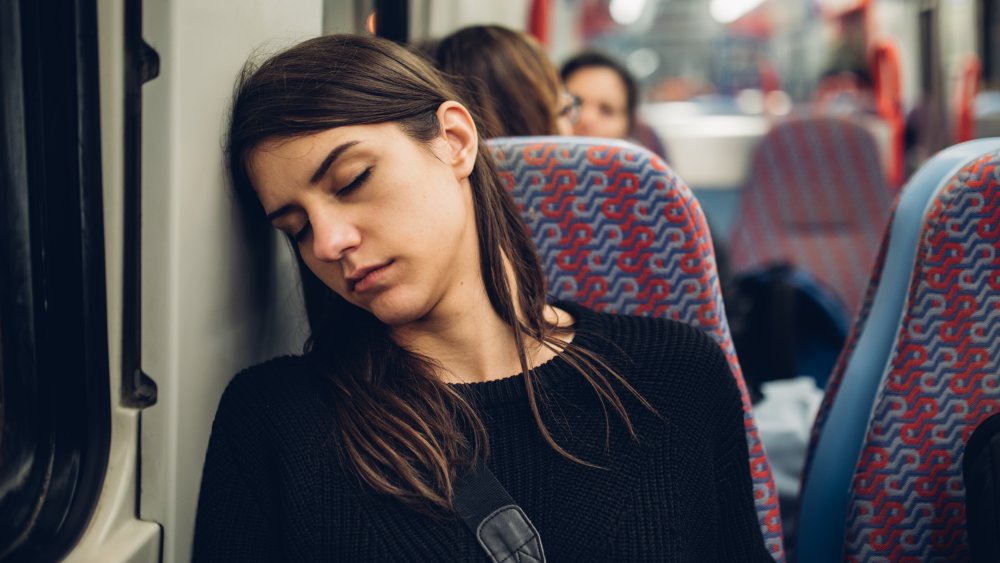
Shutterstock
Dozing off during a boring movie isn’t always a bad thing, but if you frequently feel yourself drifting at inopportune times, you’re likely suffering from lack of sleep. “Perhaps the biggest sign that you are sleep deprived is if you fall asleep easily,” sleep specialist Dawn Dore-Stites told Insider. How can you determine if you have a problem? If you were given the chance to have a nap during the day, would you also quickly fall asleep most days? If you answered yes, Dore-Stites said, “It’s a sign that you need more sleep than what you are currently getting.”
One prime factor affecting the quality of your sleep, as well as the quantity, is the late night use of screens — both big (television) and little (cell phone). “Whether you’re watching TV or engaging in social media, the experience can be very psychologically stimulating, increasing alertness and making it harder to fall asleep,” Lauren Hale, a professor of public health at Stonybrook University, revealed in an interview with Real Simple. Getting away from glowing screens is essential for good quality sleep, she advised.
Constantly asking people to speak up? Your hearing difficulties could be caused by too little sleep
Shutterstock
If you’re someone who always has your TV turned up to full blast or often ask your family members and friends to speak up, it may be time to consider what’s causing your hearing difficulties. Believe it or not, it could be the result of too little quality sleep.
Hearing difficulties are very common in the United States; according to the CDC, about 3 percent of adults aged 45-64 and 11 percent of adults over the age of 65 have trouble hearing. While many know about hearing loss, few realize it can stem from a lack of sleep.
Healthy Hearing warned that not getting enough sleep can harm blood vessels throughout the body, including within the ear. “The auditory hair cells of the inner ear depend upon good blood flow,” the site explained. If blood flow is impaired, it can damage these cells, impacting their ability to pick up sounds and send signals to the brain where the sounds are processed and identified. According to one study, researchers found that people with sleep apnea have a 31 percent increased risk of a high-frequency hearing impairment and a 90 percent increased risk of a low-frequency hearing impairment.
If you’re suddenly gaining weight or craving extra snacks, you may not be getting enough sleep
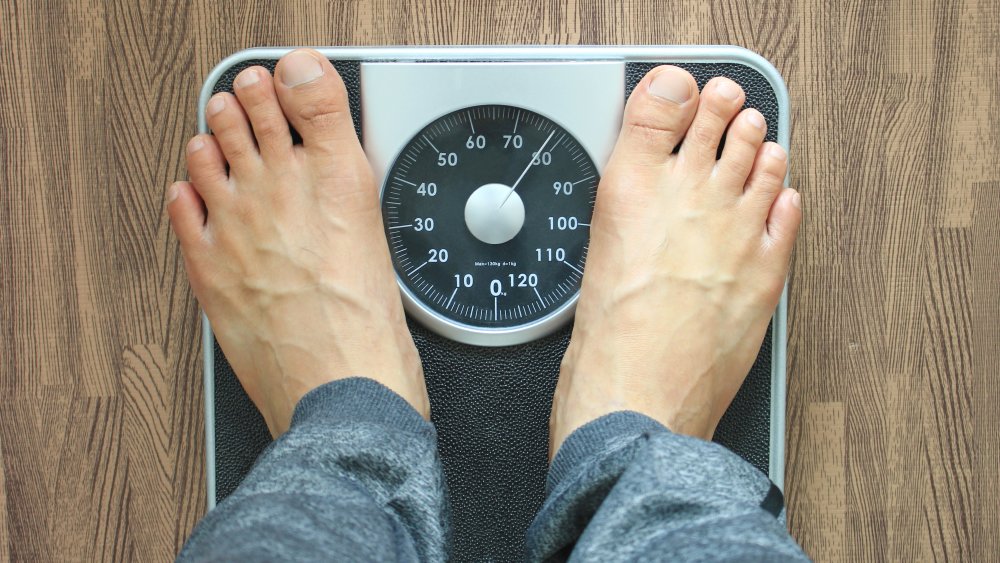
Shutterstock
It’s not your imagination that being tired makes you crave unhealthy foods. “There is no doubt that insufficient sleep promotes hunger and appetite, which can cause excessive food intake,” said Eve Van Cauter, director of the Sleep, Metabolism and Health Center at the University of Chicago in an interview with USA Today.
As Van Cauter highlighted, numerous studies show that lack of sleep can slow the metabolism and increase levels of a hormone in the body called ghrelin which makes you feel hungry, while simultaneously decreasing levels of the hormone leptin which makes you feel full. People who don’t get enough sleep are also more prone to excessive snacking, chowing down an average 385 more calories per day than they do when they’re feeling well rested.
The effect lack of sleep can have on your weight is startlingly quick, too. In a study conducted at the University of Colorado Boulder, researchers found that individuals who were restricted to just five hours of sleep a night in one workweek gained nearly two pounds, primarily due to increased snacking.
Lack of sleep could be to blame for your prematurely aging skin
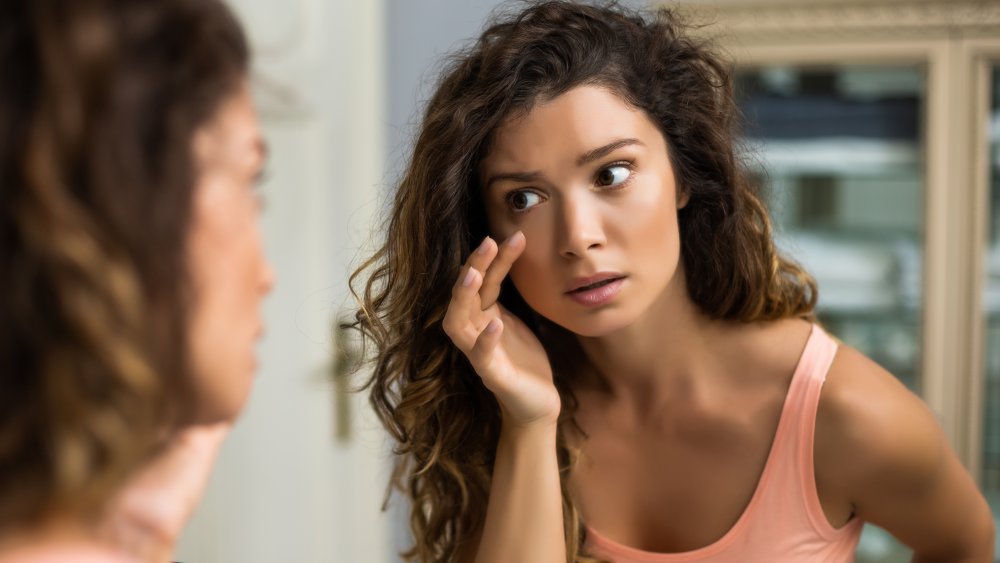
Shutterstock
As with the cells in your brain and your muscles, the cells in your face use your time spent sleeping to fight off the effects of aging. “Sleep deprived women show signs of premature skin aging and a decrease in their skin’s ability to recover after sun exposure,” Elma Baron, the author of a study featuring 60 women aged 30 to 49, told ScienceDaily.
Sleep deprivation may also impact how you’re seen by others. In a study conducted in Sweden, scientists had volunteers rate individuals who were short on sleep compared to folks who weren’t. The conclusion: The less rested the participants were, the less attractive, less healthy, and, naturally, more tired they appeared to the judging panel. This may be due to levels of the hormone cortisol, which is produced when the body is stressed by lack of sleep, dermatologist Debra Jaliman told Allure. As levels rise, she said, it can break down the collagen in the skin that helps you stay looking youthful and vibrant.
High blood pressure could be the result of not getting your required nightly sleep

Shutterstock
It’s an indisputable fact: The human heart needs adequate sleep to keep functioning at its prime. According to the National Sleep Foundation, men and women “who don’t sleep enough are at higher risk for cardiovascular disease and coronary heart disease — regardless of age, weight, smoking and exercise habits.” Just how big is the connection? The CDC warned that people who sleep less than seven hours each night face a substantially greater risk for heart disease, heart attacks, and strokes.
In many cases, the increased wear and tear on your heart comes from high blood pressure, which lack of sleep can directly impact, according to the Mayo Clinic. The experts cautioned that not getting enough sleep at night can impair your body’s ability to regulate stress hormones. When these stress hormones run around your system unregulated, they can cause your blood pressure to spike. And since blood pressure normally drops while you sleep, reducing the amount you sleep at night can keep your levels elevated for longer, furthering the damage the high blood pressure is having on your system (via CDC).
If you sex life is faltering, it could be the result of too little sleep
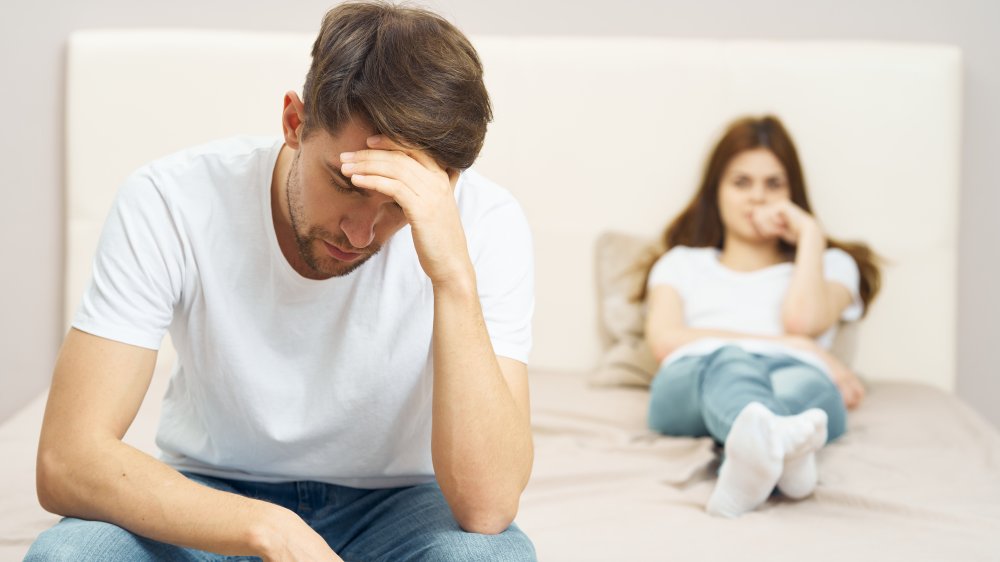
Shutterstock
Lack of sleep can be a killer in the bedroom. Men’s Journal warned that since sleep normally helps to boost a man’s testosterone, getting too little sleep can drive it in the other direction. That is, testosterone levels will start to plummet.
Lack of sleep can also wipe out a man’s overall sperm count. In a study of nearly 1,000 men, those who experienced high levels of sleep disturbances had lower-quality semen compared to men who slept well. The change appears to be caused by interruptions to the body’s circadian clock. Normally, it releases fertility-promoting hormones throughout the night, but when you interrupt this natural cycle, production of those hormones drops dramatically, Men’s Journal highlighted.
Too little sleep doesn’t just affect men. According to a study published in the Journal of Sexual Medicine, women became significantly more aroused and experienced more sexual desire when well-rested. In fact, the researchers say that just one hour of extra sleep per night increases the “odds of engaging in partnered sexual activity” by 14 percent.
Not getting enough sleep could harm your teeth

Shutterstock
Lack of sleep can hit your body everywhere — including your teeth! Research shows that the amount of sleep you get every night is directly connected to your overall risk of periodontitis and other forms of gum disease. In one study, dentists reviewed the oral health and sleep habits of 60 men and women and found that individuals who slept the least also had the greatest risk of dental problems ranging from gingivitis (inflammation of the gums) to periodontal disease, which is the development of tiny pockets between the teeth that can loosen teeth and increase their risk of falling out over time.
A study published by Plos One supported these findings. Researchers reviewed periodontal rates among people who slept less than six hours a night versus those who slept seven to eight and found that “sleep deficient individuals” were 19 percent more likely to develop the disease. This may be due to inflammation that occurs within the body in the absence of sleep. The less your sleep, the more inflamed tissues throughout your system can become, and that can cause health problems all over, including within your mouth.
Trouble communicating may be a sign that you need to sleep more

Shutterstock
It’s no surprise that being tired can make it harder for you to think of the right word when talking with a friend or colleague. But the effect lack of sleep can have on our communication skills can also be much more dramatic. Much like drinking too much, sleeping too little can actually impair the brain’s ability to communicate with others.
These findings come from a small University of California at Los Angeles study in which researchers measured levels of activity in volunteers’ brains after they stayed up all night. “We discovered that starving the body of sleep also robs neurons of the ability to function properly,” the study’s author Itzhak Fried told ScienceAlert. The more tired the test subjects were, the slower and less powerful the neurons in their brains became, he explained.
In addition to increased trouble communicating, the study may also explain why many people speak more slowly and have trouble processing and responding to the things they hear when tired.
Thinning hair or hair loss could be due to lack of sleep
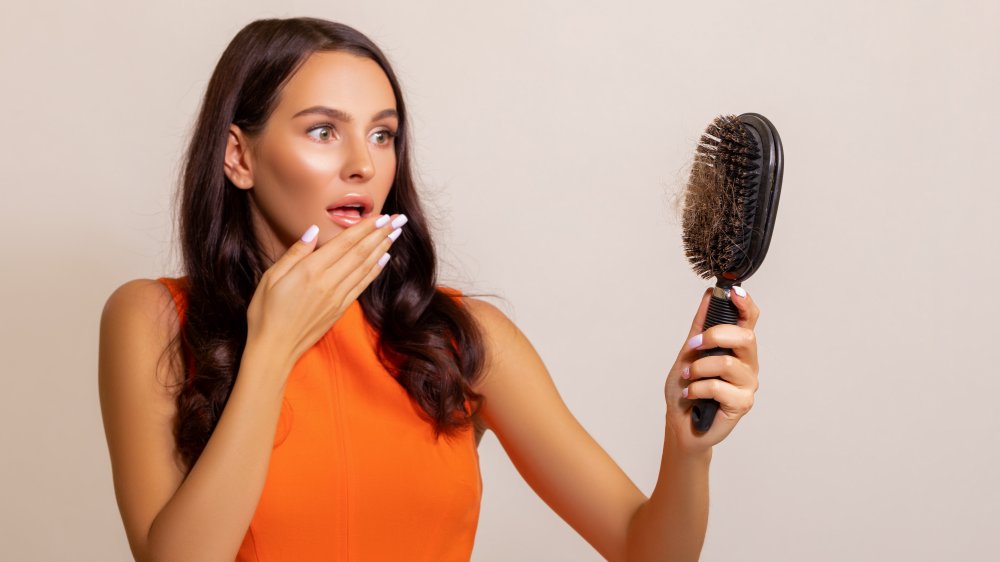
Shutterstock
The amount of sleep you get impacts every part of your body, including the individual hairs growing on your head, explained Healthline. According to the site, naturally occurring levels of human growth hormone (HGH) are produced when we sleep. Thus, they can plummet in people who are sleep deprived. As HGH levels go down, so too can the body’s ability to grow hair, resulting in thinning hair and hair loss for some individuals. Additionally, the Mayo Clinic warned that stress on the body from lack of sleep can dramatically impair hair growth.
“Sleep is important for protein synthesis of your hair, as well as proper release of growth hormone and other hormones,” dermatologist Francesca Fusco told Teen Vogue. Fusco cautioned that imbalances in sleep can also alter your body’s production of the sleep hormone melatonin, which can also impact growth of your hair and fingernails. Sleep along with a well-balanced diet and shampoos that target both the hair and the scalp may help to alleviate the condition, the expert said.
Recurring migraines may be a sign your body isn’t getting enough rest at night

Shutterstock
An estimated one in five women and one in 16 men suffer from migraines regularly, according to the American Migraine Foundation. Lack of sleep is one of the primary triggers for the condition. In a study conducted in Taiwan, researchers studied the sleeping habits of nearly 400 migraine sufferers. Individuals who experienced “poor sleep quality” were most likely to suffer migraines, even when other factors that might trigger the painful attacks, like a person’s weight, smoking, or caffeine intake, were eliminated. This may have to do with the limited amount of REM sleep (deepest stage) poor sleepers achieve.
A rodent study published by The Journal of Pain supports this idea. Researchers studied mice who were allowed normal levels of sleep and mice who were sleep deprived. They found that the sleep deprived rats “secreted high levels of proteins that arouse the nervous system and low levels of proteins that shut it down,” as WebMD explained. “In stressful situations such as sleep deprivation, these arousal proteins occur at levels that are high enough to trigger pain,” the study’s author Paul L. Durham told the site.
Too little sleep can leave you feeling down or depressed
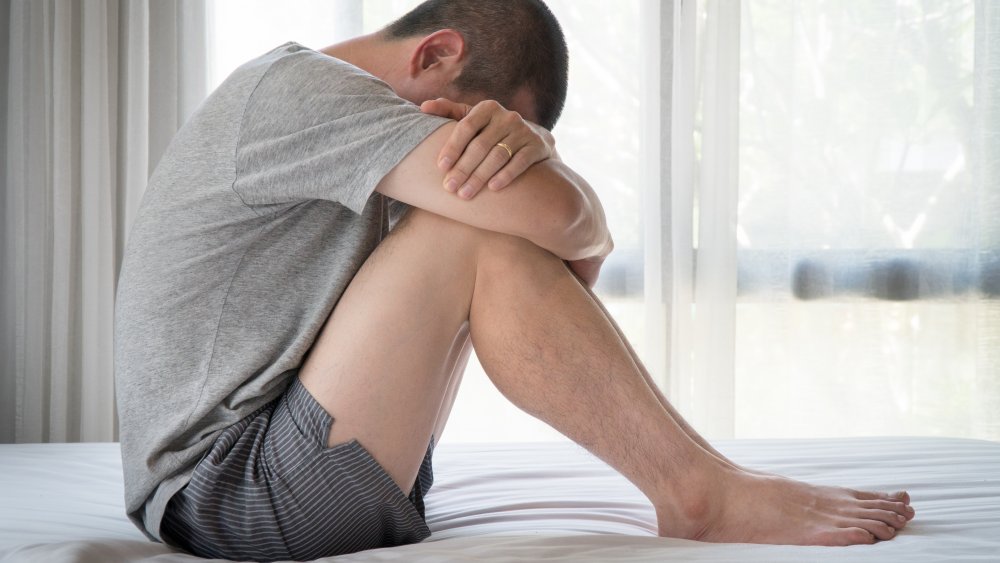
Shutterstock
Feeling sad or down from time to time is natural, but if you feel a sense of sadness, anxiety, or hopelessness bogging you down for an extended period of time, you could be suffering from depression. And problems with sleep are one of the most common symptoms of the disorder; up to 75 percent of people with depression experience symptoms of insomnia.
The connection between depression and sleep is so strong, in fact, that many doctors hesitate to diagnose one problem if the patient isn’t also complaining of the other, the National Sleep Foundation reported. Although trouble sleeping can be a result of depression, a lack of sleep is also thought to raise a person’s risk for depression.
For individuals who find themselves dealing with both depression and sleep issues, WebMD recommends a number of home remedies including meditation, regular exercise, and reductions in caffeine, alcohol, and nicotine use. Ear plugs and white noise machines may also help improve your quality of sleep.
A lack of sleep may lead to dry eyes or vision difficulties
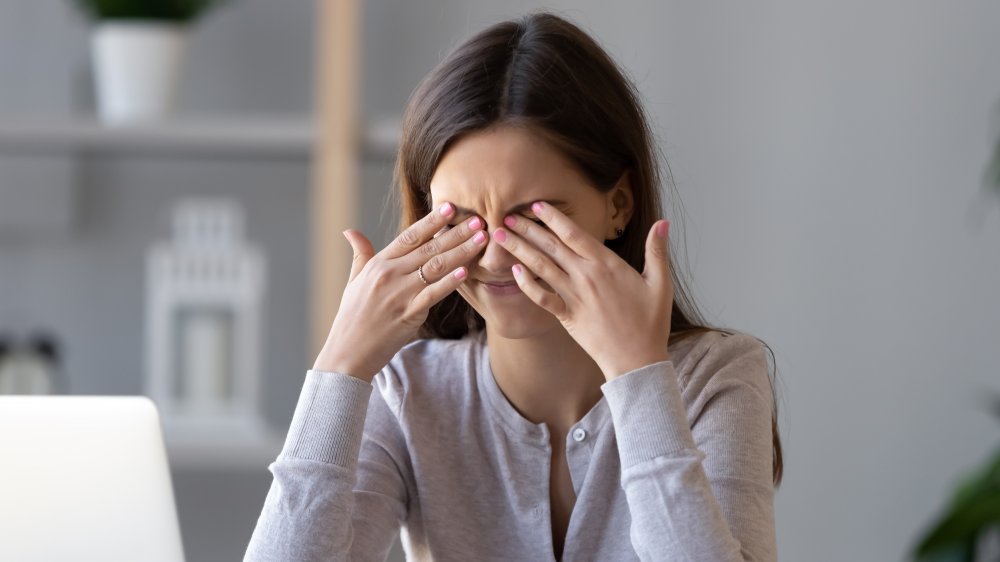
Shutterstock
Not getting enough sleep at night can leave you with more than puffy eyes and dark circles under your peepers. It can also have a dramatic, negative impact on your vision. Just as the brain and the body use the time when you’re sleeping to heal, so too do your eyes. And not getting enough sleep can leave your eyes feeling dry and itchy and looking incredibly bloodshot thanks to the decrease in the amount of oxygen being pumped to them by the body, ophthalmologist Jessica Lee told Health.
Since your eye’s production of tears can also plummet when you skimp on sleep, staying up too late too often can increase your risk of eye infections as well. Eye twitches, spasms, light sensitivity, and blurry vision are also commonly caused by not getting enough sleep, warned the eye experts at Your Sight Matters. Over time, lack of sleep could also increase your risk for more serious vision conditions, like popped blood vessels or even glaucoma.


